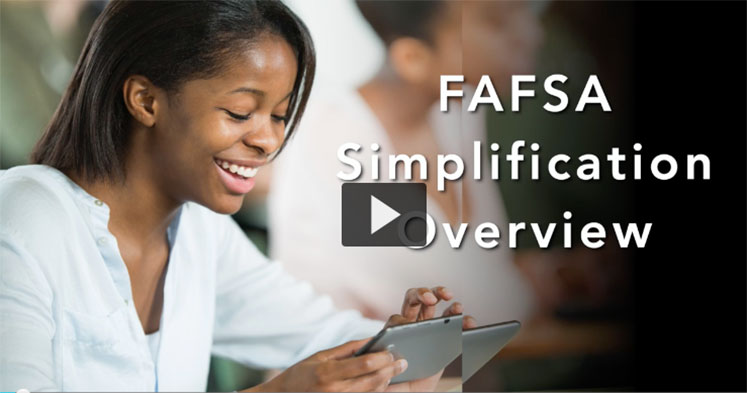Submit Your FAFSA
At WSSU, approximately 85% of our students receive some type of financial aid. We strongly encourage every student to complete the Free Application for Federal Student Aid (FAFSA), even if they have completed the FAFSA in the past and did not qualify.

Get money for college that you don’t have to pay back.
That’s right. The Next NC Scholarship is a financial aid program that helps most North Carolinians from households making $80,000 or less pursue higher education by covering more than half, if not all, of tuition and fees to attend any public university in the state. Learn more...
Applying is simple. Just submit the FAFSA form. If you’re eligible, you’ll receive the Next NC Scholarship. There are no additional forms to fill out.
The FAFSA Simplification Act was passed by Congress in 2020 resulting in a substantial revamp of the processes and systems used to award federal student aid.
Important Changes
- Both students and parents must create a Student Aid Account to get an FSA ID before completing the form. Allow at least three days.
- If parents are divorced or separated, the parent who provided the most financial support in the last calendar year will now complete the FAFSA.
- The number of students a family has enrolled in college will no longer factor into the FAFSA calculation.
- The net worth of family farms and small businesses will now be required as part of the application.
Benefits of the FAFSA Simplification Act
- Streamlined application process (from 108 questions to 46 questions).
- Expanded eligibility for federal student aid.
- Reduced barriers for many student populations including homeless and unaccompanied youth, incarcerated students, English language learners, and students from low-income backgrounds.
- Step-by-step instructions for filling out the FAFSA are available at “8 Easy Steps for Parents Completing the FAFSA Form.”
Things that Did Not Change
- The FAFSA will still be required for consideration of federal and state financial aid every year.
- Dependency status questions that determine if parent(s) must complete the FAFSA will remain the same.
- The FAFSA will still request tax information from the prior-prior year.
- The questions regarding an applicant's gender, race, and ethnicity will have no effect on federal student aid eligibility and are included for statistical purposes and data collection only.
Significant Changes to the FAFSA
The FAFSA has been streamlined from 108 questions to 46. The new form is dynamic, so some students and families won’t even be presented with 46 questions.
The FAFSA used to limit students to listing up to 10 colleges and universities. They may now list up to 20.
FAFSA has updated some of their terminology. Here are some of the changes:
Contributor(s): People asked to provide information on a student’s FAFSA form. FAFSA limits contributors to the student themselves, the student’s spouse (if applicable), the biological or adopted parent, or the parent’s spouse (stepparent). While other people may have played a significant role in raising or financially supporting the student, for FAFSA purposes, these are the only people considered contributors.
Student Aid Index (SAI): The number colleges use to determine how much financial aid a student can receive. The SAI replaced the Expected Family Contribution (EFC).
Cost of Attendance (COA): Each school’s estimated total for tuition, fees, room, board, books/supplies, transportation, and personal expenses.
Need: Cost of attendance (COA) – Student Aid Index (SAI) – Other Financial Assistance = Need
Unusual Circumstances: When a student cannot contact a parent or where contact with a parent poses a risk to the student.
Provisional Independent Student: Designation given to students who indicate an unusual circumstance.
FUTURE Act & FAFSA Simplification Act: Pieces of legislation that have impacted the user experience and qualifications for federal student aid.
Independent Student: Students who are not required to have parents contribute to their FAFSA.
An important terminology update within the new FAFSA is the replacement of the term Expected Family Contribution (EFC) with the Student Aid Index (SAI).
This name more accurately describes the number used to determine aid eligibility and, unlike the EFC, the SAI may be a negative number down to -1500.
This change allows colleges and aid administrators to determine the neediest students, rather than a cluster of students with a $0 EFC, according to the nonprofit National Association of Financial Aid Administrators.
Students with an SAI between $0 and -$1,500 will qualify for the maximum Pell Grant, which is $7,395 for the 2023-24 school year.
Families making less than 175% and single parents making less than 225% of the federal poverty level will see their students receive a maximum Federal Pell Grant award.
Minimum Pell Grants will be guaranteed to students from households below 275%, 325%, 350%, or 400% of the poverty level, depending on household structure. Pell awards between the maximum and minimum amounts will be determined by SAI.
Previously, users had the option to enter their tax information manually or use the IRS Data Retrieval Tool.
Beginning with 2024-25, all persons on the FAFSA must provide consent for the Department of Education to receive tax information or confirmation of non-filing status directly from the IRS.
In a very small number of cases, students and families will have to enter their tax data manually, but for most, that data will be automatically transferred into the application.
This change makes it easier to complete the FAFSA and reduces the number of questions to be answered.
A contributor—a new term introduced on the 2024-25 FAFSA—refers to anyone who is required to provide information on a student's form (such as a parent/stepparent or spouse).
A student's or parent's answers on the FAFSA will determine which contributors (if any) will be required to provide information.
Contributors will receive an email informing them that they've been identified as such and will need to log in using their own FSA ID (if they don't already have one) to provide the required information on the student's FAFSA.
Being a contributor does not mean they are financially responsible for the student's education costs, but it does mean the contributor must provide information on the FAFSA or the application will be considered incomplete, and the student will not be eligible for federal student aid.
Previously, the FAFSA calculated the number of household members attending college into the EFC, dividing it proportionately to determine federal aid eligibility.
Beginning with the 2024-25 FAFSA, the application will still ask how many household members are in college, but the answer will not be calculated into the SAI.
For dependent students, financial information was previously needed from the parent(s) the student had lived with the most in the last 12 months.
With the new FAFSA, financial information will be required from the parent(s) who provided the most financial support to the student.
When required, families must now report the value of their small business or family farm. If the family farm includes the principal place of residence, applicants should determine the total net value of all farm assets and subtract the net value of their principal residence to determine the final value of their farm assets.
Other Recent Important Changes
The Selective Service registration — which required male students under 26 to enroll in the draft — was removed as part of the FAFSA Simplification Act and hasn't been on the form since 2021. Students are no longer required to register for Selective Service to receive federal aid.
The FAFSA has already removed questions about drug-related convictions. Students with such charges are now eligible to receive Pell Grants.
Beginning in July 2023, students who are incarcerated in a federal or state prison and enrolled in approved prison education programs are eligible to receive Pell Grants.
Students who have been subject to an involuntary civil commitment for a sexual offense will also gain Pell Grant eligibility.
Currently, the FAFSA is only available in English and Spanish.
The 2024-25 application expanded to include the 11 most common languages spoken by English learner students and their parents.


